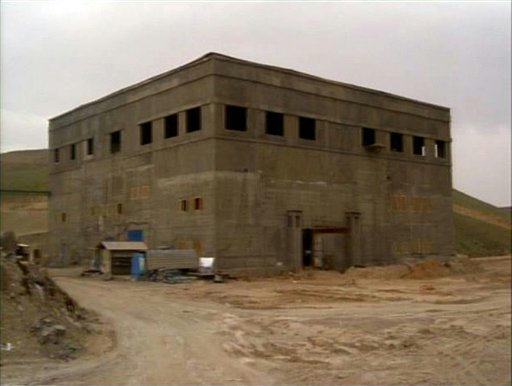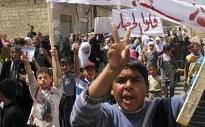.jpg) Ecuador's President Rafael Correa stated in an interview this month that his government would consider granting political asylum to Syrian head-of-state Bashar al Assad. President Assad is reportedly mulling asylum for himself, his family members, and close associates, in the event that he is forced to flee Damascus as the bloody civil war in his country escalates.
Ecuador's President Rafael Correa stated in an interview this month that his government would consider granting political asylum to Syrian head-of-state Bashar al Assad. President Assad is reportedly mulling asylum for himself, his family members, and close associates, in the event that he is forced to flee Damascus as the bloody civil war in his country escalates.
Sources state that, in a bid to explore the possibility of asylum, Syria's Deputy Foreign Minister, Faisal al Miqdad, recently traveled to Ecuador, Venezuela, and Cuba, bearing letters from Assad to the President of each country.
Correa confirmed that Miqdad visited Quito in late November, but said that the purpose of the trip was to thank Correa's administration for its "objective stance" regarding the conflict in Syria. Both Ecuador's President and his Foreign Minister denied reports that Assad had requested political asylum. However, since then Correa has spoken out regarding the possibility of hosting Assad, saying:
"Any person that requests asylum in Ecuador, obviously we are going to consider as a human being whose basic rights we have to respect … Can we believe all those news stories on violence, the dictator? Let's remember what was said about Iraq."
Anonymous Operation Syria - Press Release
Thursday - November 29, 2012 7:00 PM ET USA
Greetings World --
Today, at precisely 10:30 AM ET all Internet traffic into and out of Syria ceased. Within a half hour of this sudden shut down, the PBX land-lines were degraded by 90% and Mobile connectivity was degraded by 75%. The nation of Syria has gone dark. And Anonymous knows all to well what happens in the dark places.





WikiLeaks News:




Speakers in order of appearance:
A Canadian activist, she created Take the Square Canada and works with activists around the world to encourage and facilitate connection and communication for the revolution, both in Canada and around the world. She has been active in human rights and freedom of information for years.
Zak Yahya is a blogger at Lebanon Spring blog, where he writes about current affairs in Lebanon and Middle East. He writes in Wikileaks Central matters related to the Wikileaks cables, democracy and human rights issues. He focuses on the matters originating from the Levant - Lebanon, Syria, Israel, Palestine and Iran. You can contact him on the Lebanon Spring blog or on twitter @TheZako
Naomi Colvin is a UK activist with UK Friends of Bradley Manning and the Occupy London movement. . Her website is here.
Alexa O'Brien. In February of this year she founded usdayofrage.org, where alongside her friends, she pushed the edge of digital social media for scalable organization of civil disobedience and non-violent protest. usdayofrage.org was instrumental in the traditional and digital organization of the original September 17 action in 5 American cities, including Austin, San Francisco, Los Angeles, Seattle, Oregon, and New York, and built trusted networks that spread #occupywallstreet virally across the United States.
Since January 2011, she has covered the WikiLeaks release of US State Department Cables, JTTF memoranda known as the ‘GTMO files’, and revolutions across Egypt, Bahrain, Iran, and Yemen. She has interviewed preeminent US foreign policy expert on the Cambodia cables, and published hours of interview with former GTMO guards, detainees, defense lawyers, and human rights activists, as well as WikiLeaks media partners, including Andy Worthington, GTMO historian and author, and Atanas Tchobanov, Balkanleaks' spokesman and co-editor of Bivol.bg.
Listen to the conversation here.
Not speaking often publicly on general issues is a main attribute of the top leadership in the Syrian Baathist regime. They rarely allow themselves to be faced and challenged by the media. The regime tends to convey its messages via different proxies and mouthpieces who are regime-linked. These unofficial spokespeople meet foreign officials or media to express the official line.
Take for example the Syrian uprising which is seven months old now. Rarely has a Syrian official has showed up in any TV show since the 'troubles' started in Syria; nothing like an interior minister, sub-minister or even a spokesman. The task is usually done by 'analysts', 'academics' or 'strategists' who are actually fiercer than the regime itself in expressing the official line. A lot of these names have become infamous now as they have been hosted almost full-time on satellite channels like AlArabiya and AlJazeera. Dr. Taleb Ibrahim is one of these. Of the few times the Syrian Foreign Minister Walid Muallem spoke to the media for example, they were in press conference type meetings rather than debate talk show types. Still, he managed to wipe out new countries when he spoke.

This is a "WikiLeaks News Update", a daily news update of stories that are obviously related to WikiLeaks and also freedom of information, transparency, cybersecurity, and freedom of expression.
>> Updates on WikiLeaks news from #wlfind twitter hashtag (as curated by @wikileaks):
* FBI Director asked Mubarak for Egyptians' fingerprint records for FBI 'global fingerprint database'.
* Saudi King Abdullah "must have had a hand" in forced divorce verdict, maybe to "set an example".
* An entire report of the involvement of Greece and Souda bay military base on the Iraq war.
* Palestine Authority pursuit of Israel through the ICC would be viewed as war by Israel.
* Greeks were told that US base in Crete had no involvement with NATO bombing. Truth: it supplied fuel to B52.
* Israeli official: "We don't do Gandhi well" in reference to how Israel deals with nonviolent protests.
* "Unrest December 2009 Athens - What happened" : A full report from US embassy cables.
* U.S. Ambassador : "Singapore elects, um selects its President".
Syria:
Israel
Syria:
Current news of any violations, legal progress, setbacks or other news in human rights as defined in the Universal Declaration of Human Rights.
Syria: Assad continues to ignore the UN security council, the Arab League, the governments of Saudi Arabia, Kuwait, Bahrain and almost everyone else, killing at least 90 civilians this week, for a total of almost 2000 since the protests began in March.
United States: A US federal appeals court ruled on August 8 that former Pentagon chief Donald Rumsfeld had no immunity against being sued personally by US citizens Donald Vance and Nathan Ertel who allege torture at the hands of US troops. Last week, a US district judge in Washington ruled separately that a former American military contractor who also claims he was tortured in Iraq could sue Mr Rumsfeld. A lawyer for Mr Rumsfeld said the decision "puts American soldiers at risk". Further appeals by the US justice department to the Seventh Circuit Court of Appeals or to the US Supreme Court are possible.
On July 12, Human Rights Watch produced an extensive report entitled Getting Away with Torture: The Bush Administration and Mistreatment of Detainees.
Carol Rosenberg covers the rehearsals for Guantanamo trials.
On the 1st of August 2008 Syrian General Muhammad Suleiman, who also bore the title of Special Presidential Advisor for Arms Procurement and Strategic Weapons for President Bashar al-Assad, was murdered in highly mysterious circumstances. General Suleiman was shot three times in the head, neck and stomach at his home in the exclusive Rimal al-Zahabieh resort in the Mediterranean city of Tartous. It was speculated then that the shots came from a sniper located on a boat, which explained how the top level security forces surrounding Suleiman were avoided. At this time relations between Syria and Israel were at their worst and the talk of war was in the air, particularly due to Syria’s intent on upgrading its nuclear and chemical weapons facilities, a strategy headed by Suleiman. Therefore, most of the international press, most notably The Sunday Times, stated as a fact that it was Israeli intelligence agency Mossad who was to blame.
An inside job
Recent cables published by Wikileaks, however, shed a new light on the assassination, revealing a very delicate multi-lateral diplomatic situation. The fact that this information came from the U.S. embassy in Paris is particularly revealing. In cable #08PARIS1717 Ambassador Stapleton, says that Boris Boillon, adviser at the French presidency, asserted to him that “the killing seemed to be some sort of inside job”.

This is a "WikiLeaks News Update", a daily news update of stories that are obviously related to WikiLeaks and also freedom of information, transparency, cybersecurity, and freedom of expression. All the times are GMT.
04:40 PM A top-secret document obtained by The Guardian reveals information was extracted through illegal torture of prisoners overseas by the MI5 and MI6 with authorization from Tony Blair's government.
The allegations echo evidence of torture by Iraqi forces that had been exposed by WikiLeaks last year. (via thinq_)
12:40 AM A ‘Conversation with Mark Stephens’, Julian Assange’s former lawyer, is to take place in Glasgow, on the 1st September. Topics will include the law surrounding freedom of information and the European arrest warrant, and possibly ‘the increasing prevalence of denial of service attacks’. For more details: An Interview with Mark Stephens at Strathclyde university
06:00 AM Legislation that could keep Guantanamo open indefinitely will be voted on by the U.S. Senate in early September. This legislation has already been passed by the House of Representatives.
To prevent this from happening, please call your two Senators and and urge them to take a stand against Guantanamo!
To do this you can either
* call the Congressional switchboard at (202) 224-3121 and ask for your Senators
Authored by JP Orient
Our times are characterized by narratives from authority that don't pass the test of logic.[1] The case of Syria's alleged "non-peaceful" nuclear reactor, destroyed by Israeli warplanes in September 2007, illustrates how technical knowledge has been diminished by argument from authority.[2] This analysis explores an alternate narrative wherein Syria's "Box on the Euphrates"[3] was a natural-uranium production facility and not a U.S.-alleged atomic reactor.
The U.S. narrative
After years of lackluster investigation and Syrian non-cooperation, inspectors reified U.S. assertions in June 2011 that Syria's Dair Alzour site was probably a nuclear reactor.[5] Their key evidence was an indeterminate number of anthropogenic uranium particles found at the site along with limited satellite imagery that was augmented by U.S.-supplied photos of undisclosed domain showing the inside of a reactor.[6] Syria was referred to the UN Security Council as a potential threat to "international peace and security."
Dair Alzour building near completion, date unknown (USG)

 Anonymous sources report that Turkey is considering a number of options to help Syrian President Bashar al Assad defuse the uprising in his country.
Anonymous sources report that Turkey is considering a number of options to help Syrian President Bashar al Assad defuse the uprising in his country.
According to Ivan Watson, CNN's Istanbul based correspondent, multitudes of Syrians are entering Turkey. 10,757 Syrian refugees in total. 12 have been recorded having bullet wounds. 441 recorded having returned to Syria in past 24 hours, and 76 new arrivals today, Ivan reported.
On June 23, the Turkish Foreign Minister Ahmet Davutoglu, reportedly spoke with his Syrian counterpart, Walid al-Moallem, about the security situation in Syria. Both apparently discussed the movement of Syrian troops and refugees on their shared border, a situation that has created tension for both.
Despite the public condemnation of Syrian President Bashar al Assad for his regime’s use of violence against the opposition, Turkey has privately endorsed a strategy towards Syria that endorses Syrian internal political and social reforms.
Turkey has provided Syrian opposition forces, including the Syrian Muslim Brotherhood (MB), open forums to organize.
According to STRATFOR sources, one of the options Turkey is considering is a political model akin to the Lebanese political system. Lebanon operates on a confessional system and on a 1932 census that roughly divides power between the country’s Christian and Muslim sects. The proposal for Syria would entail equally dividing power between the country’s Arab and Kurdish Sunni majority and the country’s minorities — Alawites, Druze and Christians. The system would create checks and balances to prevent either side from monopolizing the political system or imposing its will on the other.
"We don’t believe the government anymore. All their decisions are just ink on paper for us." - Omar Ali, a Kurdish-Syrian activist.
Thirteen human rights groups have signed a press release condemning the Arab League's support of Syria's bid for a seat on the UN Human Rights Council. The regional group for Syria has the same number of nominations as they have seats available, so at this point Syria seems guaranteed a seat. While the human rights groups feel that support for Syria's bid is an "an insult to the UN body and its mission", a quick glance at the current membership shows Syria, who have killed some 220-250 of their own citizens in recent weeks and detained and tortured close to a thousand, should feel right at home. While Libya was recently suspended, the council still has Bahrain, Saudi Arabia, the United States, Gabon, Nigeria, Cameroon and enough other countries with sordid human rights records to constitute a jury of their peers. They need support from half of the members, when the vote takes place on May 20.
SANA state news agency today published the decrees on ending the state of emergency, abolishing the Supreme State Security Court, and regulating the right to peaceful demonstration, signed today by President Bashar al-Assad. Opposition activist Haitham al-Maleh told Reuters the move was "useless", and "The problem is that the ruling elite and the security have put their hands on the judiciary, and that other legislation they had introduced exempted the security forces from being held accountable to law."
Abdel Halim Khaddam, a former Syrian vice president based in Paris told BBC Arabic: "The crisis in Syria has nothing to do with the presence or absence of the state of emergency. It is not the state of emergency that arrests people and takes them to jail and it is not the state of emergency that fires on people. ... Assad has exposed himself completely before the people, through the crimes committed by his security apparatus. This has created a deep feeling among Syrians that the continuation of the regime would be a catastrophe. The depth of the rift between the regime and the majority of the people... will lead to the collapse of a regime desperately struggling to survive."
Yesterday protests continued unabated by the announcement, as the country gears up for what both sides are expecting to be a huge demonstration with huge retaliation. This week has seen a concentration on government crackdown on students and universities, with many arrested and beaten. Security is readying for Friday, when protests are expected in 40 or more cites, by deploying armed security in plainclothes everywhere protests are expected. Tanks are reported in Tahrir Square in Homs.
Theme by Danetsoft and Danang Probo Sayekti inspired by Maksimer